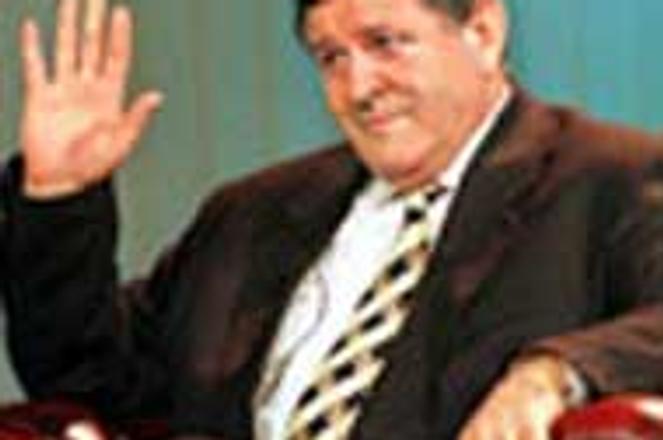Mečiar waved goodbye after the 1998 election, but now he has decided he would like to be president.photo:TASR
Former Prime Minister and chairman of the opposition HZDS party Vladimír Mečiar declared his presidential candidacy in a final-hour announcement April 9, thus interrupting the seven-month-long silence he has kept since being denied another term as prime minister after the September, 1998 elections.
Mečiar will be one of 10 candidates in Slovakia's first direct presidential elections, which are scheduled for May 15. The candidates range from front-runner Rudolf Schuster, a SOP deputy and the mayor of Košice, to relatively unknown independent candidate and philosopher Boris Zala (see related story, page 5).
Mečiar's entrance into the race has been met by serious warnings from ruling coalition politicians and some analysts, who said that electing the former prime minister for a president would halt the current government's efforts towards integration into the European Union and NATO.
Ján Langoš, chairman of the Democratic Party, a faction of the ruling coalition SDK party, said he connected Mečiar to an era of weak democratic principles, disrespect of law, corruption, clientelism, and the stealing of state property.
"The candidacy of Vladimír Mečiar is an attempt to renew such principles [of governing] in Slovakia, but the Democratic Party is convinced that the citizens will refuse Vladimír Mečiar's attempt to draw the country back," Langoš said.
Mečiar's allies, on the other hand, said they believed the well-known leader was their only real choice for a presidential candidate. Deputies for the Movement for a Democratic Slovakia (HZDS) said they came back to Mečiar after a long search through their party.
"Our problems with picking the candidate [for the HZDS party] showed us that we again should turn to Mr. Mečiar to take this difficult role on his shoulders," HZDS vice-chairman Marián Augustín Húska said.
According to Tibor Cabaj, the chairman of the HZDS parliamentary caucus, the party also nominated Mečiar to run for head of state on the strength of the appeals of civic initiatives by groups such as pro-national organization Matica Slovenská, and at the request of Mečiar's numerous devoted supporters.
The HZDS backed Mečiar's candidacy with signatures from 42 of its 43 party's parliamentary deputies. According to the presidential election law, 15 deputies' signatures are needed to nominate a partisan candidate, while a non-partisan candidate must be nominated through a petition carrying 15,000 citizen signatures.
Iffy chances
Despite the fact that some analysts and ruling coalition politicians agree that Mečiar could get a significant support as a leader of the largest party in parliament, they claim he would not secure enough votes to beat coalition candidate Rudolf Schuster.
"I personally don't think that he [Mečiar] has got a real chance to win the race," said Janusz Bugajski, Director of the East European Studies Department at the Washington-based Center for Strategic and International Studies, on April 12.
The latest opinion poll conducted by the state Institute for the Research of Public Opinion on the presidential elections indicates that the joint candidate of the ruling coalition, Rudolf Schuster, is the clear race leader. Schuster gained 32.4% of the votes of the 1,347 polled citizens.
Schuster was followed by civil candidate Magda Vášáryová with 19.1%. Former President Michal Kováč secured the third highest score of 8.3%. Ex-Prime Minister Vladimír Mečiar was sixth with only 4.9%, following SDK deputy Juraj Švec (5.7%) and the opposition SNS party leader Ján Slota (5.3%).
Mečiar's best chance at the presidential seat lies in the possibility of pushing the election to a second round, analysts and politicans said. If none of the eleven nominated candidates gain over 50% of popular support, the two candidates with the highest scores will enter a second round on May 29.
But even then Mečiar would probably lose, said Bugajski and Grigorij Mesežnikov, President of Institute for Public Affairs, an independent think tank.
"This could be his last attempt to return to the highest politics, because he can't be a real politician," Bugajski continued, adding that Mečiar "is either a leader or no one."
A new strategy
The presidential campaign will not highlight just the same old Mečiar. According to HZDS's Húska, the party leadership does not want to repeat the bombastic campaign it ran before the September national elections, when Mečiar paid international show-biz stars to come to Slovakia to support him and, in doing so, turned away voters who accused him of throwing away their money during an economic crisis.
"We'll have to change our strategy," Húska said in an interview for the daily Slovenská Republika. Mečiar's team will prepare the so-called "compensation" campaign based on the ideas presented by the other candidates in the media, he said.
For ex-President Michal Kováč, whose intense political battles with the former prime minister often descended into the personal, Mečiar's candidacy is a serious matter.
"We must build a firm barrier to his effort to disrupt Slovakia once again," he said. "I am resolved to win the Kováč-Mečiar battle. I will contest the citizens' favor until the election victory," he said at an April 12 press conference.
That Mečiar was nominated by the HZDS leadership, analyst Mesežnikov said, indicates that the party is having a problem creating an identity separate from that of its chief.
"It shows that there's a lack of self-reflecting assessment of a real situation inside the party," Mesežnikov said.


